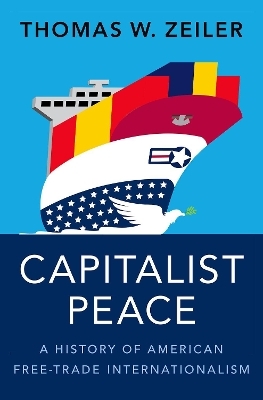
Capitalist Peace
Oxford University Press Inc (Verlag)
978-0-19-762136-3 (ISBN)
A wide-ranging history of modern America that argues that free trade has been an engine of US foreign policy and the key to global prosperity.
Surprisingly, exports and imports, tariffs and quotas, and trade deficits and surpluses are central to American foreign relations. Ever since Franklin D. Roosevelt took office during the Great Depression, the United States has linked trade to its long-term diplomatic objectives and national security. Washington, DC saw free trade as underscoring its international leadership and as instrumental to global prosperity, to winning wars and peace, and to shaping the liberal internationalist world order. Free trade, in short, was a cornerstone of an ideology of "capitalist peace."
Covering nearly a century, Capitalist Peace provides the first chronologically sweeping look at the intersection of trade and diplomacy. This policy has been pursued oftentimes at a cost to US producers and workers, whose interests were sacrificed to serve the purpose of grand strategy. To be sure, capitalists sought a particular type of global trade, which harnessed the market through free trade. This liberal trade policy sought the common good as defined by the needs, aims, and strengths of the capitalist and democratic world. Leaders believed that free trade advanced private enterprise, which, in turn, promoted prosperity, democracy, security, and attendant by-products like development, cooperation, integration, and human rights. The capitalist peace took liberalization as integral to cooperation among nations and even to morality in global affairs. Drawing on new research from the Reagan, George H.W. Bush, Clinton, and George W. Bush presidential libraries, as well as business/ industry and civic association archives, Thomas W. Zeiler narrates this history from the road to World War II, through the Cold War, to the resurgent protectionism of the Trump era and up to the present.
Offering a new interpretation of diplomatic history, Capitalist Peace shows how US power, interests, and values were projected into the international arena even as capitalism brought both positive and negative results to the global order.
Thomas W. Zeiler is a Professor of History and Director of the Program in International Affairs at the University of Colorado Boulder. He is the author and editor of numerous books, including Free Trade, Free World: America and the Advent of GATT, Globalization and the American Century, and Annihilation: A Global Military History of World War II (OUP, 2010). He served as the President of the Society for Historians of American Foreign Relations and as editor of its journal, Diplomatic History.
Acknowledgments
Abbreviations
Introduction Capitalist Peace
Chapter 1 Depression, 1930-1935
Chapter 2 Dictators, 1936-1940
Chapter 3 Universalism, 1941-1945
Chapter 4 Security, 1946-1950
Chapter 5 Containment, 1951-1954
Chapter 6 Offensive, 1955-1958
Chapter 7 Competition, 1959-1963
Chapter 8 Revolt, 1964-1970
Chapter 9 Shock, 1971-1979
Chapter 10 Victory, 1980-1990
Chapter 11 Globalization, 1991-2000
Chapter 12 Crisis, 2001-2021
Conclusion A Near-Century of Capitalist Peace
Notes
Bibliography
Index
| Erscheinungsdatum | 17.08.2022 |
|---|---|
| Zusatzinfo | 25 black and white halftones |
| Verlagsort | New York |
| Sprache | englisch |
| Maße | 237 x 164 mm |
| Gewicht | 671 g |
| Themenwelt | Geisteswissenschaften ► Geschichte ► Regional- / Ländergeschichte |
| Geschichte ► Teilgebiete der Geschichte ► Wirtschaftsgeschichte | |
| Wirtschaft ► Volkswirtschaftslehre ► Wirtschaftspolitik | |
| ISBN-10 | 0-19-762136-8 / 0197621368 |
| ISBN-13 | 978-0-19-762136-3 / 9780197621363 |
| Zustand | Neuware |
| Haben Sie eine Frage zum Produkt? |
aus dem Bereich


